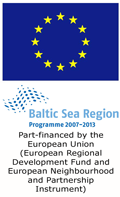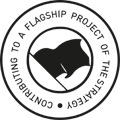12.04.2012 | Gdansk | Poland
Workshop of Educational Group for Youths from Hamburg, Kaliningrad and Gdansk
During the days from 12.04.2012 till 16.04.2012 students from three schools of Hamburg, Kaliningrad and Gdansk were invited to participate in a Workshop of Educational Group for Youths under the coordination of European Foundation for Monuments Protection.
Polish School of Engineering and Environment was the host of the Workshop. The other two participating schools were Emil Krause Gymnasium from Hamburg-Barmbek and Kaliningrad State College of Urban Development.
The aim of this cooperation is to provide students with necessary knowledge to raise their awareness of the need to reduce climate change and increase energy efficiency of buildings, brick historical buildings in particular. Such approach, in order to be successful, should be promoted already on the stage of school education.
Participants of the Workshop had a full five day program of activities concerning three main aspects: common history, importance of protecting built heritage and energy efficiency in monuments.
Students-guests were acquainted with the host school teaching program, especially regarding such topics as environment observation and protection. They were introduced to the school laboratory and weather measuring instruments.
They had also a chance to participate in a discussion with several experts on history, architecture and energy efficiency in buildings. The aim of these discussions was to help them understand the problem of heritage protection and energy efficiency in historical buildings.
Apart from that participants were divided into three international groups, each of them had a separate task to accomplish during the Workshop. One of the groups focused on historical aspects. Already in Hamburg they prepared a questionnaire related to awareness of heritage value of brick buildings. It was then spread among Hamburg citizens, the results were presented in Gdansk and compared with the results of parallel questionnaire from Gdansk. Thanks to them students could find out what is the opinion of city residents about their brick built heritage. The second group was working on social and cultural importance and the aspect of comfort of living in brick buildings. Their aim was to answer one question: Do we want/need to live in brick historical buildings? The third group made a comparison between energy efficiency of old “untouched” and restored buildings. They used thermo imagining method to illustrate the contrast in heat transfer through brick building and its elements.
To show the difference between old non-restored buildings, old restored buildings and modern eco buildings students were taken for two trips. The first one to Letnica – restored old district of Gdansk Grzegorz Lechman explained its cultural value of the area, built for factory workers in the beginning of 20th century. He discussed technologies, new materials and conservatory methods used to revitalise buildings.
During the second trip students visited modern ecological district in Osowa Most of the buildings there are still under development. After the completion the area is supposed to become the biggest eco-residency in Europe. The two buildings that are ready, are available for visiting. On their example Arkadiusz Zaklewski explained new technologies implemented. The buildings are furnished with such innovations like solar panels, heat collectors and heat storage systems installed underground.
The Workshop was concluded with a tour around main restored monuments in Gdansk. Students had also a chance to see the revitalised old city fortifications Hewelianum – interactive educational centre when they made final summary.
Results of the Workshop participants presented during the International Conference “Monuments Protection and Energy Efficiency” on 16th of April 2012. In front of their older colleagues – experts from the Baltic Sea Region - they proved their knowledge and awareness of the importance to protect built heritage and expressed enthusiasm to be involved and continue to work collectively to reach common goals in this subject.
This workshop shows that protection of historical heritage that belongs to countries connected historically and which share similar architecture should be undertaken in a mutual agreements and cooperation. It is a beginning of future cooperation between schools in and institutions from Baltic Sea Region.
We would like to thank Aleksander Nagucki the Director of School of Engineering and Environment in Orunia, Gdansk , Berndt Tissler Vice Director of Emil Krause Gymnasium in Hamburg -Barmbek , Elena Podnebesnykh Vice Director of Kaliningrad State College of Urban Development and Bartosz Niezbrzycki from European Foundation for Monuments Protection for commitment and essentially support with organization of successful workshop.
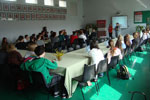
- Aleksandra Kocialkowska (source: European Foundation for Monuments Protection)
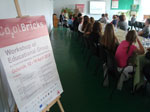
- (source: EFOZ)
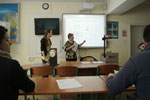
- Tutorial at School of Engineering and Environment in Gdansk
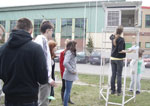
- Weather measuring booth at School of Engineering and Environment in Gdansk (both source: Emil Krause Gymnasium Barmbek)
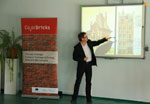
- Dr. hab. Jakub Szczepanski
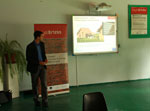
- Arkadiusz Zaklewski (source: Kaliningrad State College of Urban Development)
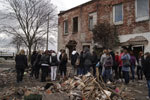
- Grzegorz Lechman (source: Emil Krause Gymnasium Barmbek)
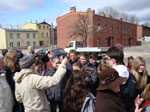
- Buildings in Letnica Grzegorz Lechman (source: EFOZ)
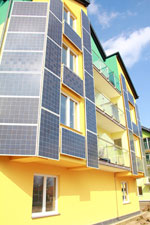
- Eco house in Osowa (source: Kaliningrad State College of Urban Development)
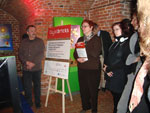
- Handing over Certificates
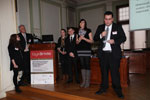
- Presentation of Hamburg School
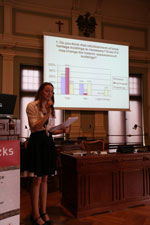
- Presentation of Polish School
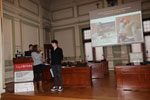
- Presentation of Kaliningrad School (all source: EFOZ)

